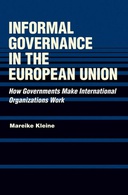Explore
Informal Governance in the European Union
Mareike Kleine
2013
0 Ungluers have
Faved this Work
Login to Fave
The European Union is the world’s most advanced international organization, presiding over a level of legal and economic integration unmatched in global politics. To explain this achievement, many observers point to its formal rules that entail strong obligations and delegate substantial power to supranational actors such as the European Commission. This legalistic view, Mareike Kleine contends, is misleading. More often than not, governments and bureaucrats informally depart from the formal rules and thereby contradict their very purpose. Behind the EU’s front of formal rules lies a thick network of informal governance practices.If not the EU’s rules, what accounts for the high level of economic integration among its members? How does the EU really work? In answering these questions, Kleine proposes a new way of thinking about international organizations.
This work is a translation of Informal Governance in the European Union.
Informal Governance in the European Union is a translation of this work.
This book is included in DOAB.
Why read this book? Have your say.
You must be logged in to comment.
Rights Information
Are you the author or publisher of this work? If so, you can claim it as yours by registering as an Unglue.it rights holder.Downloads
This work has been downloaded 645 times via unglue.it ebook links.
- 141 - pdf (CC BY-NC-ND) at OAPEN Library.
- 130 - mobi (CC BY-NC-ND) at Unglue.it.
- 123 - pdf (CC BY-NC-ND) at Unglue.it.
- 161 - epub (CC BY-NC-ND) at Unglue.it.
Keywords
- Agenda-setting theory
- Decision-making
- EU & European institutions
- European Parliament
- European Union
- international institutions
- International relations
- KUnlatched
- Member state of the European Union
- Political Science
- Political Science / International Relations
- Politics & government
- Society & Social Sciences
Links
DOI: 10.7591/cornell/9780801452116.001.0001Editions


